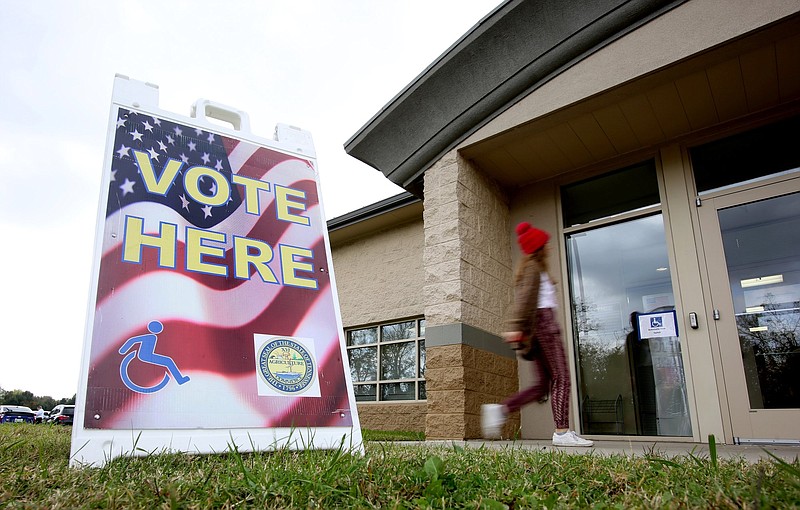NASHVILLE - Tennessee's 2020 political season is in full swing with Democratic presidential hopefuls already staffing up, making visits and, in some cases, spending money to win over voters in the Volunteer State.
That's because Tennessee is one of 14 states holding its presidential primary on Super Tuesday - March 3. Other Super Tuesday states include Alabama and North Carolina.
But Tennesseans may want to mark an even earlier date on this year's political calendar: Feb. 12. Because that's when two weeks of early voting begin here in the Republican and Democratic presidential primaries.
At least two Democratic billionaires, former New York City Mayor Michael Bloomberg and Tom Steyer, are already spending on TV. Bloomberg last month began buying time on Chattanooga television, according to federal filings.
In the meantime, U.S. Sen. Elizabeth Warren, D-Mass., has made inquiries on rates with the same local station. Supporters of U.S. Sen. Bernie Sanders, D-Vt., are organized. And Democrat Pete Buttigieg has the endorsement of Chattanooga Mayor Andy Berke. There's been little visible activity from former Vice President Joe Biden.
But while Democrats are vying with each other now for Tennessee Democrats' votes to win their nomination, the state is expected to go to Republican President Donald Trump come November.
It remains to be seen whether the president's eventual Democratic rival will return in the fall to actively campaign for the general election, let alone spend any more money here to rally his voters.
Still, the Democratic nominee is almost certainly going to be in Nashville on Oct. 22. That's when the third and final presidential debate in the 2020 general election is scheduled at Belmont University.
U.S. SENATE RACE
Presidential politics aside, there's also a U.S. Senate race underway. Republican U.S. Sen. Lamar Alexander announced in December 2018 he wouldn't seek re-election and there are two GOP hopefuls. One is Nashville surgeon Manny Sethi, who announced in June even as then-Gov. Bill Haslam was still deciding on whether to run.
Haslam didn't run. But a former top aide of his, former Economic and Community Development Commissioner Bill Hagerty, a venture capitalist who later became Trump's U.S ambassador to Japan, is. And in a first, the president announced Hagerty's candidacy in a tweet last June before Hagerty was able to leave the U.S. State Department and formally declare in early September.
In 2018, Tennessee's U.S. Senate election was a multimillion-dollar clash with Republican Marsha Blackburn and former Democratic Gov. Phil Bredesen vying to succeed retiring Sen. Bob Corker, a Chattanooga Republican.
Blackburn, who had no real primary, won the general election with massive infusions of money from Senate Majority Republicans and other GOP-aligned groups. She also had Trump's help as the president hit the state repeatedly to stump for Blackburn, then a congresswoman.
This year, the action is expected to come in the GOP's Aug. 6 Senate primary.
Sethi took many by surprise by announcing as Haslam claimed he was weighing a run. After Hagerty announced, Haslam later contributed to him.
In a December poll by Vanderbilt University, 41% of those surveyed said they had heard of Hagerty, while only 6% said they knew of Sethi. Nine percent said they had heard of Democrat James Mackler, a Nashville attorney and Iraq War veteran who started running for Senate in 2018, only to bow out to Bredesen. He is running in 2020 along with three other declared candidates.
Dr. John Geer, a Vanderbilt political science professor and the Vanderbilt Poll's co-director, said Hagerty has "an advantage right now, but it could be closer" eventually. But he also noted that Trump's vocal support in a state he won and is expected to win again is a "big catch" for Hagerty.
Still, Geer noted, "I think Hagerty would make a big mistake if he underestimates Sethi," adding Sethi has displayed "some talent" on the campaign trail. "We're a long way from the primary," Geer said, adding "how much does Trump keep pushing?" for Hagerty.
"I know Sethi is really trying to differentiate himself so far on issues," said Kent Syler, a Middle Tennessee State University political science professor. "I still think that Hagerty starts out with an incredible advantage, you know, with the Trump support. He starts in a very good position. I wouldn't change places."
Hagerty reported raising $1.9 million in his disclosure for the July 1-Sept. 30 period. He spent just $24,436.67 and reported $1.82 million in cash on hand at the end of the reporting period.
Sethi, who entered the contest in June, reported total receipts of $2.4 million, $1.52 million of it coming from personal loans.
Besides Mackler, Memphis environmental activist Marquita Bradshaw, MTSU professor Diana Onyejiaka and Gary Davis, a perennial candidate, have announced for the seat.
"I don't think many Democrats are optimistic about that race," Geer said.
Well, Tennessee Democratic Party Chairwoman Mary Mancini says she is.
"We have a chance to win, absolutely," Mancini said, adding that "trends in Tennessee overall are changing. The demographics are changing. The Democratic vote is up." People who self identify as Republicans "are willing to vote for an alternative," she said. "That doesn't mean it's guaranteed. We have opportunities at every level including the U.S. Senate."
Her counterpart, Tennessee Republican Party Chairman Scott Golden, says dream on.
"No maps have Tennessee being a battleground state," Golden said. "We feel very confident."
CONGRESSIONAL RACES
At this point, Tennessee has just one open seat in its heavily Republican nine-member Congressional delegation, where the GOP controls seven of nine seats.
On Friday, U.S. Rep. Phil Roe, R-Johnson City, made it official: He won't seek re-election to a seventh term to the GOP-reliable 1st Congressional District.
None of the other Tennessee incumbent congressmen, Republican or Democrat, appear in any danger at this juncture, but that doesn't mean they won't face challenges. Some already are.
But after facing tough campaigns in his first three elections, U.S. Rep. Chuck Fleischmann, an Ooltewah Republican representing Tennessee's 3rd Congressional District, appears to be riding high as he seeks a fifth term.
Fleischmann has no serious challenger in the GOP primary. No Democratic challenger has yet emerged, although Mancini would like to see one.
"I've not had anyone expressing interest," she said. "We have not got a candidate yet. Absolutely, we want to make sure we have candidates running in every race."
Pointing to the 2018 cycle where Democrats won two state House races but netted one seat after losing another contest, Mancini said, "What might be a tough district one cycle is a closer, winnable district the next."
Hamilton County Democratic Party Chairwoman Khristy Wilkinson said she doesn't think the congressional seat is competitive at this point.
"So it's my position we are better off on using our resources on a seat like [state] Senate District 10," she said.
That seat is held by Republican Sen. Todd Gardenhire of Chattanooga. One Democrat, former Hamilton County commissioner and one-time county Democratic Party Chairman John Allen Brooks, hasn't officially declared he's running. But Brooks, who didn't return phone calls, has filed paperwork with the state to raise money as a candidate. Others appear to be looking at the seat, as well.
STATE LEGISLATIVE CONTESTS
Republicans now hold 28 of the Tennessee Senate's 33 seats, with Democrats holding only five. House Republicans likewise have a super majority, holding 73 of the 99 seats there. Democrats have 26.
But Democrats hope to pick up several seats or at least make serious challenges based on some moderate Republican suburbanites and women becoming disenchanted with Trump and Republican policies. The party has identified a number of state House and Senate districts where in 2018 - with Bredesen running for U.S. Senate and former Nashville Mayor Karl Dean running for governor - it looked increasingly good.
Almost all are in urban and suburban Hamilton, Davidson, Shelby and Knox counties, with Democrats looking also at a seat in Montgomery County.
For example, Democrats won the Hamilton County portion of Gardenhire's district, which includes much of Chattanooga, with 51%. But they lost in the heavily Republican portion of adjoining Bradley County, where the party picked up only 27% of the vote.
Gardenhire, expected to seek a third term, has reached out to both black and Hispanic constituents living in the Hamilton County portion of the district.
While Democrats hope to make modest gains, Republicans are virtually certain to retain expected large majorities in the General Assembly.
Legislators elected in November will be the ones redrawing state legislative and Congressional maps in 2022 redistricting. And Republicans are still expected to hold the power of the pen in redrawing lines for all 132 legislative districts.
Contact Andy Sher at asher@timesfreepress.com or 615-255-0550. Follow on Twitter @AndySher1.

